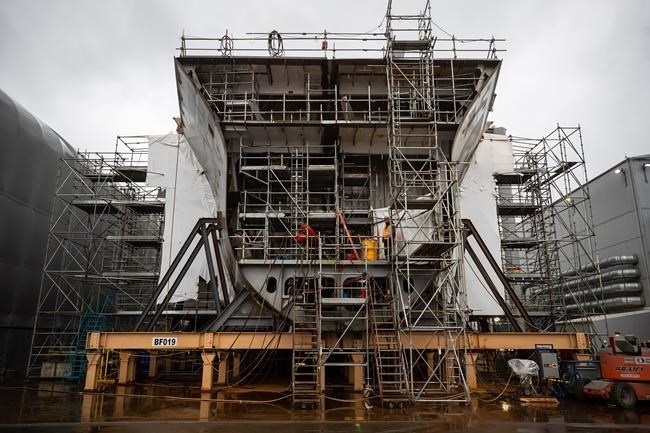OTTAWA — Newly released documents show the navy will need help resupplying its fleets at sea even after two multibillion-dollar support vessels are built.
The documents obtained by The Canadian Press show that the navy plans to rely on Chantier Davie's MV Asterix and allies to ensure there is no “capability gap” even after the two new joint support ships are finished in next few years.
Canada originally planned to buy three new navy support ships when it launched the project more than a decade ago, but cost overruns saw the order cut down to two. The vessels are being built in Vancouver at a combined cost of $4 billion.
Yet navy officials have continued to indicate that two support ships are not enough to meet the maritime force's long-term needs, as the government’s policy requires the military be able to operate two fleets at sea at the same time.
The fear is that the navy will be hamstrung whenever one of the two so-called joint support ships is out of commission, either for repairs or for some other reason.
While the documents play down such a threat, they also acknowledge that to prevent a “capability gap,” the navy will need to rely on the Asterix as well as “sailing with and leveraging allies and partners who have support-ship capabilities.”
Canada was forced to rely on allies when its previous two support ships were taken out of service earlier than expected in 2014.
Yet such an approach has been criticized as undermining the Canadian military’s autonomy and flexibility, which is why the government decided to start leasing the Asterix from Davie in January 2018 until the two new joint support ships arrived.
The vessel is in the midst of a five-year leasing arrangement between Ottawa and the Quebec company, with an option to extend the lease by another five years in 2023. The government could also buy the vessel.
Parliamentary budget officer Yves Giroux last week estimated the cost of buying the Asterix at $633 million, while extending the contract could cost more than $500 million. Giroux estimated Asterix’s sister ship, MV Obelix, could cost $797 million.
The Liberal government has so far resisted calls to purchase the Asterix or Obelix, despite pressure from opposition parties as well as Davie and the Quebec government.
It has instead repeatedly described the Asterix as a stopgap until the two new joint support ships arrive, the first of which is due in 2023. Defence Minister Harjit Sajjan’s spokeswoman Floriane Bonneville repeated that message Wednesday.
“Our investment into the new joint support ships will provide the full suite of military requirements for at-sea support that the Royal Canadian Navy requires to do the challenging work we ask of them to protect Canadians,” Bonneville said in an email.
“Until the arrival of the two Protecteur-class joint support ships … the RCN is mitigating its gap of at-sea support capability through the interim auxiliary oiler replenishment commercial-based service contract involving MV Asterix and collaboration with Canada’s allies.”
In a separate email, Defence Department spokeswoman Jessica Lamirande said a decision on whether to buy the Asterix or extend the lease with Davie “will come in due course and while considering the broader context of the needs of the CAF as a whole.”
The Asterix, which was at the heart of the failed prosecution of now-retired vice-admiral Mark Norman, is currently docked in Halifax. Since entering service with the navy, it has sailed on a number of Canadian military missions around the world.
Conservative defence critic James Bezan, who has been among those pushing the government to buy the Asterix as well as the Obelix, said it is clear the Navy needs the vessels to be able to function properly at sea.
"We believe that Asterix should stay in service, that Obelix should be built and that both (joint support ships) be built so that we have the ability to maintain that blue-water fleet,” Bezan said.
“That way we can send the navy out and if one of our supply ships happens to be out of service, we can backfill it with (Asterix or Obelix)."
NDP defence critic Randall Garrison said it has long been clear that Canada needs more than two support ships to ensure the navy isn't impaired whenever one is out of service, though he questioned whether the Asterix is the best fit.
The military has previously said the new joint support ships have better systems to avoid mines, protect against chemical, biological, radiological and nuclear threats, a better propulsion system, a bigger helicopter hangar and more self-defence capabilities.
"We've always supported three joint supply ships," Garrison said.
"Can the Asterix serve as the third in some capacity even though it has reduced capability? I think we should ask the navy that."
Davie spokesman Frederik Boisvert in a statement described the Asterix and Obelix as "a class-leading design which has become the envy of global navies."
This report by The Canadian Press was first published Nov. 25, 2020.
Lee Berthiaume, The Canadian Press


